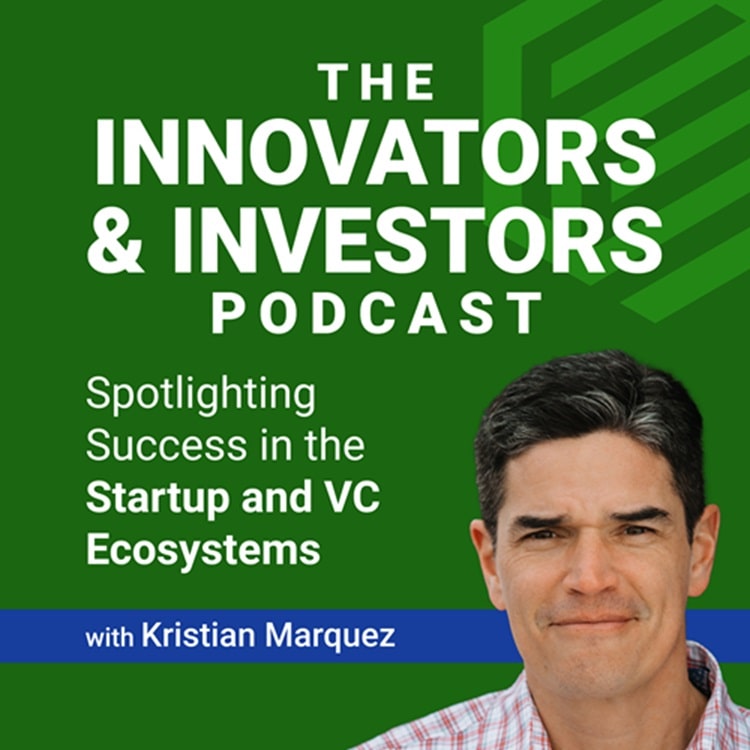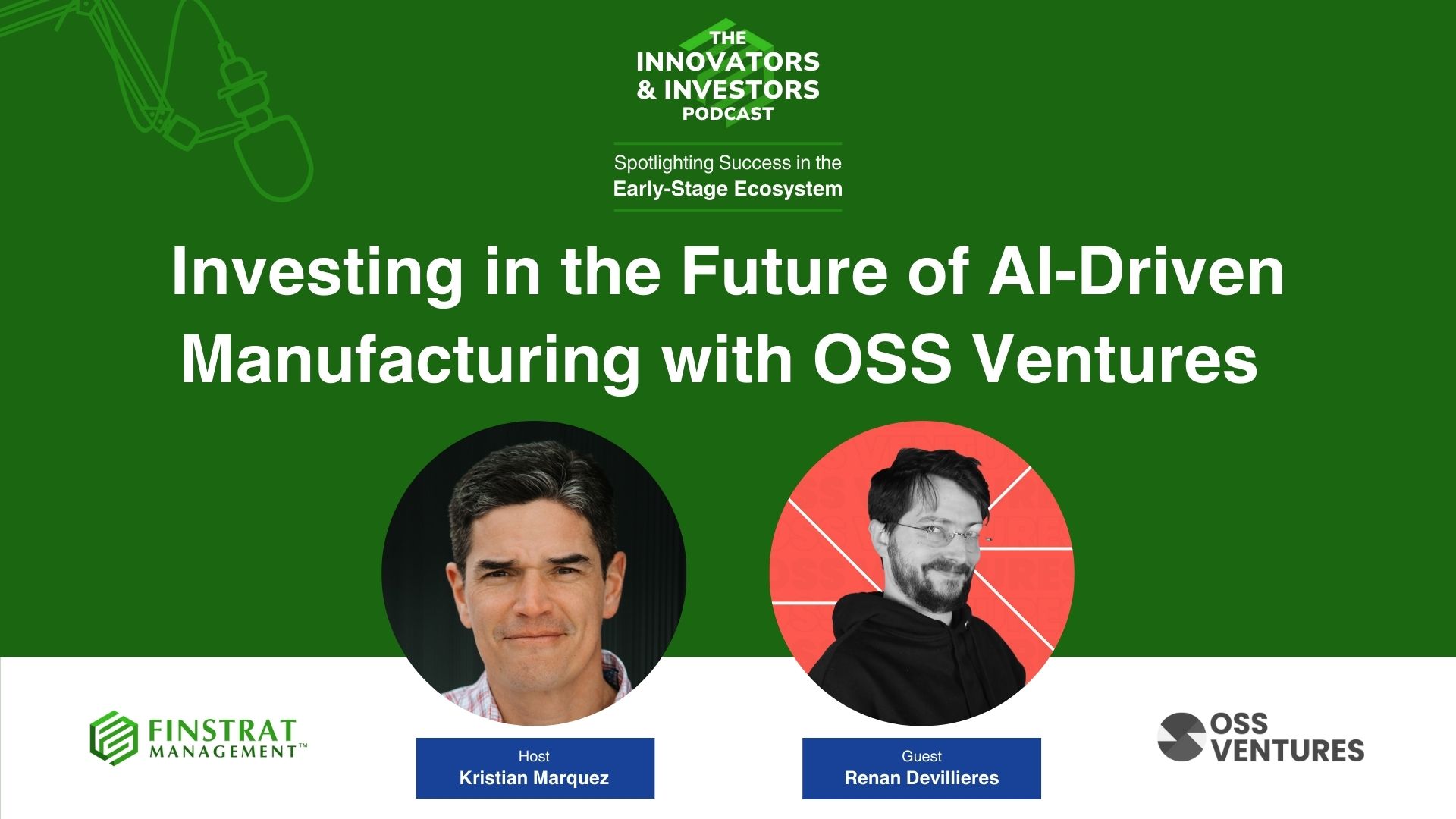Highlights
- OSS Ventures invests early in tech startups transforming manufacturing and supply chains with AI and software.
- Only 5% of factories today operate like “tech companies,” but OSS aims to boost that to 50% in a decade.
- Fabric, an OSS portfolio company, uses AI to digitize and optimize factory lean processes at scale.
- OSS Ventures is geographically agnostic but focuses on Western factories due to differing global labor economics.
- Robotics adoption is expected to 100x in 20 years, expanding from factories to service sectors.
- Successful AI in manufacturing hinges on verticalized, human-centered control of systems and rules.
- Renan’s entrepreneurial journey underscores the importance of patience, speed, and cultural adaptability.
Summary
In this episode of the Innovators and Investors podcast, host Kristian Marquez interviews Renan Devillieres, founder and CEO of OSS Ventures, a venture fund and builder focused on technologically transforming manufacturing and supply chain operations. Renan shares the origins and mission of OSS Ventures, which invests in early-stage tech companies aimed at modernizing factories, warehouses, and logistics by integrating AI, data, and software solutions. OSS Ventures uniquely supports founders from inception, often investing when founders are at the idea stage or just starting, and actively helps scale their products by leveraging a network of over 2,200 industrial sites, generating significant early revenue through introductions.
Renan highlights key portfolio companies like Fabric, a 150-employee firm that digitizes factory lean processes and applies AI to proactively solve production issues in over 600 factories. OSS Ventures primarily invests in software companies, including hardware-backed solutions such as sensors, with a global but Western-centric geographic focus due to differing manufacturing dynamics in regions like China and India.
Renan’s personal journey began with engineering studies in France, followed by roles in consulting and factory operations in aerospace and luxury sectors. He later founded a tech startup in San Francisco focused on AI-driven workforce placement, which he successfully exited. His inspiration for OSS Ventures came after witnessing Tesla’s advanced, tech-enabled factories, which served as a model for how factories worldwide could be transformed into efficient, high-tech environments.
Renan categorizes factories into three groups: “doer visionaries” (top 5%) that operate like tech companies; “getting there” (20%) in transition; and the rest struggling with inefficiency and poor conditions. OSS Ventures’ goal is to increase the “doer visionary” factories to 50% in the US and Europe within ten years.
The discussion explores the impact of AI and robotics on manufacturing and the workforce. Renan believes AI will revolutionize intellectual labor similarly to how machines transformed physical labor, increasing productivity while shifting human roles toward oversight and problem-solving. Robotics is expected to grow 100-fold in the next two decades due to decreasing automation costs and improved AI capabilities, with applications expanding beyond factories to service industries like elder care.
Renan emphasizes the importance of vertical-specific AI solutions in manufacturing and supply chains, where success depends on ecosystems that enable humans to control rules and orchestrate systems. He foresees consolidation in robotics, with a few dominant players initially followed by widespread adoption across sectors.
Finally, Renan reflects on lessons for his younger self: investing in Bitcoin, embracing entrepreneurship earlier, relocating to the US sooner, and recognizing the value of patience and persistence. He credits mentors and colleagues for their impact and encourages founders and manufacturing leaders to connect with OSS Ventures to help drive the industrial revolution forward.
Key Insights
- Transforming Manufacturing with Software and AI: OSS Ventures’ unique model as both a builder and investor allows it to nurture startups from the idea stage, embedding operational expertise alongside capital. This hands-on approach, backed by a vast network of factories, accelerates market adoption and revenue generation, addressing a traditionally slow-to-innovate sector. The integration of AI in monitoring and proactively solving factory issues, as exemplified by Fabric, marks a significant leap from reactive manufacturing processes to predictive, data-driven operations.
- Geographic and Labor Cost Implications: Renan’s observation that Western factories face similar challenges, while factories in China and India operate under different labor cost dynamics, highlights the nuanced global industrial landscape. In regions with cheap labor, automation incentives differ, impacting the adoption rate of AI and robotics. This insight underscores the importance of tailoring technological solutions to specific market conditions rather than applying a one-size-fits-all approach.
- AI as a New Industrial Revolution: Renan frames AI’s impact as analogous to the mechanization of factories in the 20th century, where productivity soared, and labor shifted from manual tasks to system oversight and problem-solving. This perspective provides a balanced view against dystopian narratives of AI displacing all jobs; instead, it suggests a reorganization of human capital toward higher-value activities, with AI augmenting rather than replacing human intelligence.
- Human-Centered AI Ecosystems in Manufacturing: The future factory is envisioned as a highly automated environment where humans control the “rules” and problem-solve exceptions rather than execute repetitive tasks. This highlights the critical role of ecosystems that enable seamless collaboration between AI systems and human operators, ensuring agility and continuous improvement. The example of Shein’s supply chain team managing massive operations with data scientists illustrates the power of skilled human-AI collaboration.
- Strategic Focus on Early Believers: OSS Ventures’ pivot to focus only on factories and executives already convinced of technology’s potential is a pragmatic strategy to accelerate impact. By targeting the roughly 15-20% of “believer” factories willing to invest and scale AI solutions, OSS can create demonstrable success cases that drive broader industry adoption over time, similar to how mechanization initially took hold among early adopters.
- Robotics Revolution and Market Structure Uncertainty: The prediction that robotics will grow 100-fold over 20 years, driven by AI-powered contextual understanding and real-time code generation, points to a transformative future for physical automation. However, the uncertainty about whether this market will consolidate among a few dominant players or fragment into numerous specialized companies reflects ongoing debates about innovation diffusion, capital intensity, and competitive dynamics.
- Entrepreneurial Lessons and Cultural Adaptation: Renan’s reflections on his career journey—from public servant economist to factory director to tech founder and investor—underscore the value of cross-cultural experiences, persistence, and timing. His advice to embrace entrepreneurship sooner, move to innovation hubs like the US, and balance urgency with patience offers valuable guidance for aspiring founders navigating complex and evolving industries.
Conclusion
Renan Devillieres’s insights reveal a compelling vision of the future of manufacturing—one driven by AI, robotics, and software that transform factories into high-tech, efficient, and enjoyable workplaces. OSS Ventures’ hands-on, founder-friendly approach harnesses early-stage innovation and leverages deep industrial networks to create scalable impact. The conversation situates this transformation within broader economic and technological trends, highlighting the balance between human expertise and machine intelligence, the evolving structure of industrial automation markets, and the critical role of mindset and culture in entrepreneurship. As manufacturing and supply chains undergo this profound change, OSS Ventures stands at the forefront, enabling the next industrial revolution with technology, talent, and strategic focus.
Stay up-to-date with Renan Devillieres and his work with OSS Ventures.
Follow the show on your podcast channel of choice or listen below.




